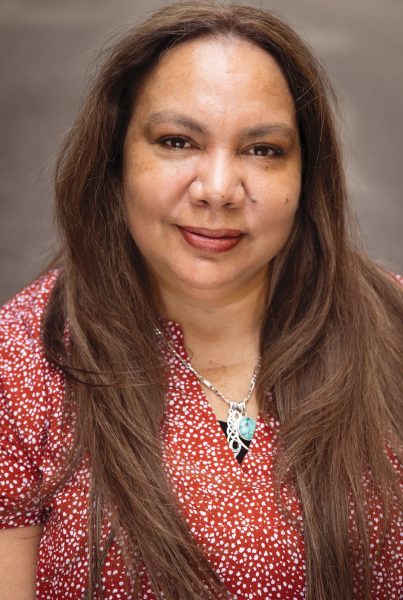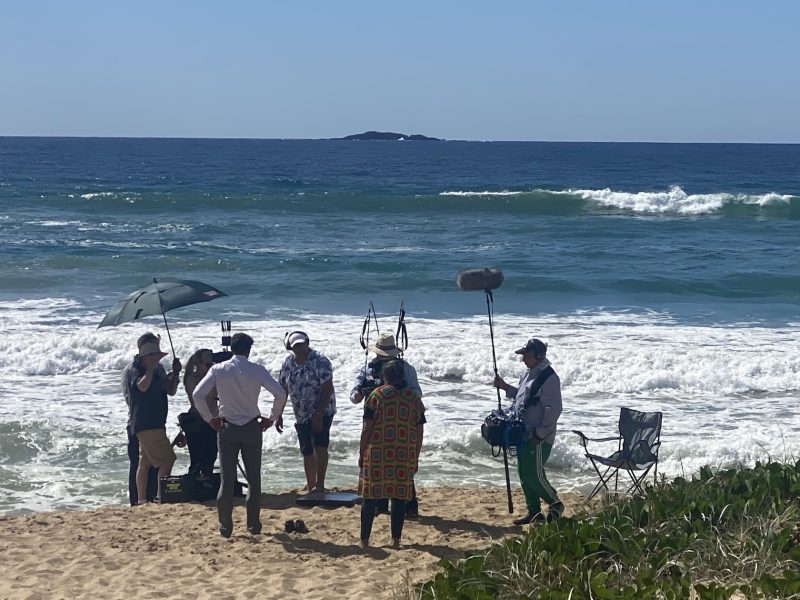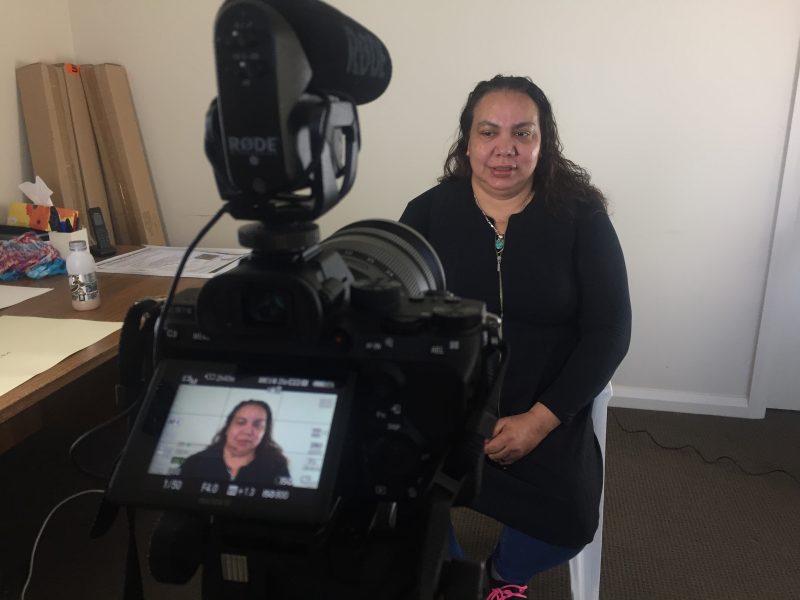Pauline Clague is a Yaegl woman from the North Coast of NSW and a seasoned storyteller and producer working across film, television, podcasting, vodcasting and academics.
In addition to her producing work, Clague was the Commissioning Editor and Head of Internal Productions at NITV from 2013-2015. She is also the co-creator of the annual 72hr challenge ‘NATIVE Slam’ and Associate Professor, Manager of Cultural Resilience Hub, Jumbunna Institute for Indigenous Education & Research at University of Technology Sydney.
Clague is also the Founder and Artistic Director of the Winda Film Festival which has partnered with SXSW Sydney this year and will run until 20th October. ‘Winda’ means ‘stars’ – more precisely the stars in the sky around the time for stories to be told in Yaegl and Gumbayngirr nations (between October to December). The WINDA programme at SXSW will showcase both Australian and International First Nations storytelling, 17th-20th October 2023.
Clague’s work is often politically charged, motivated by injustice and ultimately seeks to uplift First Nations voices through truth-telling. Clague was the recipient of the Natalie Miller Fellowship in 2020, she also won the Stanley Hawes award for her contribution to Australian documentaries in 2015.
In this Colour Box Studio Interview, Clague discusses her current project; the Coota Survivor Stories, her first foray into feature length drama and the emergence of the “Chiller” genre.

Tell us a little bit about yourself and what you do.
I am Pauline Clague a Yaegl woman from the North Coast of NSW. I am a Producer and storyteller (means I dabble in writing, both academically on film and scripts as well director, artist, podcaster/vodcaster, whatever tools will help us to lift up story of our people.
How did you start your creative practice and why?
I officially started by going to AFTRS to do a course designed by the late Lester Bostock in TV and I suppose I came into the industry when the options had just opened up. The Indigenous Unit was in is inception and as one that liked to organise everyone, I turned to producing as a natural way of bringing community together and creating the space for director’s to tell their stories. I suppose being part of the Sand to Celluloid Initiative with Director/Writer Rima Tamou’s “Round Up” we upscaled quickly and have never looked back from the passion and the bug of making films and telling our stories.
Where did you grow up and how has it influenced your practice?
I was born in Alice Springs, but we moved back to our country just when we started primary school and then moved to Sydney for high school. I think living on country and being around a large family we always had imagination and rode and walked around our country liked we knew it all. I am not sure if it is the spaces but also the people. Our mother and father always made us have strong views (all girls in our family) we also were taught to think and question and as our parents were active both within community and politically we met so many people that were mentors both elders back in the day and big names. They wanted us to face head-on the challenges we would face from society, but to also impact and change the world.
A strong sense of community and care is something that was instilled in all of us and I think that has been the bit that has influenced me. Plus they were both workaholics, so I got their trait of always doing as much as you can for community and family.
Tell us about your past creative projects. What has been your most treasured highlight so far?
I suppose as a Producer I have gone through the craft of being able to do what I love. I see all of my works as my treasured highlights. “Round Up” (1995) was so special as our first film as it won so many awards and helped us see how much a film can impact, “Promise” (1997)was in Broome and the Kimberley’s in the late 1990’s at a time when it seemed so far from everything and taught me persistence. Being the Series Producer for “Messagestick” and creating the body of work for filmmakers and stories to be told around Australia. Finally doing my parents film “When Colin Met Joyce” and being able to find a thread of a love story to impact the political threads. My work internationally with imagineNATIVE and being able to stay in the Indigenous space of filmmaking for most of the year. Working with friends like Libby Hakaraia on creating the international 72 hour challenge “NATIVE Slam” and bringing international filmmakers together to work on films. Working at NITV and creating works that shook up the broadcasting space to allow the emerging sector to get credits with work like “Our Stories, Our Way, Everyday”, to starting Winda Film Festival to spotlight Indigenous stories, to the body of work currently of filming the Cootamundra Survivors stories, to the current tackle of the Feature “Promise Mum.”
I have been so enriched by each work and each has taught me something new about storytelling and the craft of how to implant our narrative, our way.

Tell us about your current project?
As stated above I have a few:
Winda Film Festival has partnered this year with SXSW Sydney and we will be showcasing 7 sessions of Indigenous Films and Filmmakers from around the globe.
“Promise Mum” is our unicorn project, our first feature drama. Rima Tamou and myself started in the industry 30 years ago and we promised coming out of the pandemic we would push into the feature, it is an independent film shot with the support of many and with a lot of love and weaving of old and new friends in the industry. We hope to finish by end of year for release in 2024.
“Coota Survivor Stories” has been the work of 4 years in the making recording stories of the women who were at Cootamundra Girls Home, it is such an important body of work to make sure their stories are recorded and there for future generations to learn from and heal from.
“Colleano Heart” a documentary on the Aboriginal Circus family who rose to be some of the celebrated performers in the 1920-1930’s in America and Europe and the journey for the following generations to come back to Australia and connect with their country and family here.
Who or what inspires your practice?
My parents inspire me, the stories inspire me, my friends inspire me, the next generation inspires me. I know that sounds a bit obtuse, but I am thankful for the people that come into my life and grace me with their stories and seeing our next generation thrive in the space is so uplifting.
Where do you feel most creative and why?
I find being back on country grounding, I weave and do creative arts when I feel like I have been sitting in front of a computer too much. Saltwater is always somewhere that makes my mind clear, but so does driving. I usually have a seven hour drive to get home to family every other weekend.
What do you hope audiences take from your work?
It depends on the works, for some of our work we want to shock them, otherwise it is a dialogue and sometimes they just need to feel the work. I think some of the best compliments have been around when captured the true essence of our parents on screen. I think back in the day when we showed cultural killings of our native animals on screen, you use to get outrage from people always thinking that our culture was stagnant and “we shouldn’t be using guns to kill animals”, or “they are protected so why can Aboriginal people kill them”, I remember replying to someone that “culture is not stagnate, like you don’t have a ball and chain still around your ankles”.
I think the ones where the community have felt heard in our larger projects like “Sorry for Your Loss” which told the story of Indigenous Women Deaths in Custody, using the design of a cell block, voices of actors retelling 6 of the womens’ stories, the work of the community on the possum cloak and the fun elements of tearing into the Royal Commissions recommendations and making a paper mache toilet, the families felt we honoured the women and having a culturally safe space for them to engage and let go of some of the hurt and see the stories there for people to see.

What gets you through creative challenges or tough industry times?
It is an industry that can be hard, but I love it, I always say the day I lose the passion is the day I will leave this industry and I am still as passionate today as I was 30 years ago.
I have had some real dark days in the last few years, but I chose to rise above the “distraction” of the ego and thinking about the community and the need for our “voice, truth-telling, story-healing” and living in the truth of narrative and story.
Covid taught us that you can slow down and still get the work done, but you also need to be kinder.
Plus I enjoy the differing ways of telling story, it is not so linear as the world wants it to be, I can still be a storyteller in other forms of art, podcasts, vodcasts, music, writing, the narrative is not all one-sided and we need to find the people that lift each other up not tear each other down.
What future projects are you looking forward to?
Finishing the feature and sending it out to the world, it is such a passion project for us and is woven with stories from my youth.
The international Indigenous family collaborations is something I am keen to keep working on and engaging outside the space.
Whose work are you digging at the moment?
I am so proud of Mi-Kaisha, she is a musician, but her work overseas and now back in Australia. She is one of our “think Big, but always remember community” entertainers.
Film wise I am interested to see what some of that emerging talent from WA and SA will do.
Internationally, in the Indigenous arena we have a plethora of smart filmmakers redefining and places some context around our own Indigenous genres, Like the “Chillers” the Cultural Thrillers that are a mix of horror and our scary stories or the “Pathogen Apocalyptic” where a disease takes out colonial structures and Indigenous people have to rise up to be the leaders of tomorrow.
Where can we find and follow you online?
This last year I have taken myself offline more and more as the negativity has been intense, and I don’t have the time to be distracted, but Windafilmfest.com and @windafilmfest I try to post up to their a bit more frequently.
Winda Film Festival runs through to the 20th October in Sydney. You can book tickets here.
Some of the works we have done for vod/podcasts:
waraburranura.com/resource/__podcast
But 2024 we will be coming back onto socials.
